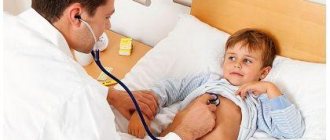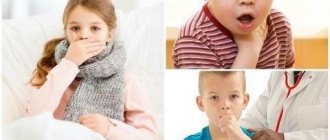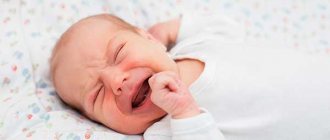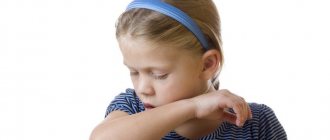Residual cough in a child is often observed after respiratory tract infections. The general condition has already returned to normal, but a dry or wet cough is bothering me.
In most cases, residual cough is not dangerous and does not require treatment.
Why is it developing?
The mucous membrane of the upper respiratory tract performs a protective function. This is achieved due to the presence of mucociliary clearance - a cleaning system, which is represented by two components:
- Cilia are outgrowths of the epithelium. Moving towards the nasal cavity, they remove foreign particles from the bronchi.
- Bronchial mucus is produced by the bronchial glands. Foreign particles (dust, microorganisms, pus) dissolve in mucus, which facilitates their removal.
When the upper respiratory tract becomes inflamed, the mucous membrane is damaged. This is accompanied by a decrease in the protective function of clearing foreign particles.
It takes time to restore the mucous membrane, an average of three weeks. At this time, a residual cough is observed, which occurs due to the consequences of the underlying disease - damage to the mucous membrane.
Another cause of post-infectious cough is increased reactivity of the respiratory tract due to inflammation of the mucous membrane. It is characterized by the fact that the smallest stimulus leads to activation of the cough reflex.
What diseases can cause residual cough:
- laryngitis;
- tracheitis;
- bronchitis;
- pneumonia.
A prolonged cough can be a consequence of acute respiratory diseases (ARI) - viral and bacterial.
Causes of residual cough
There are several reasons for residual cough. One of them is due to the fact that during illness the mucous membrane of the respiratory organs becomes inflamed and irritated. It takes time to restore the mucous membrane. With normal immunity, such a cough can bother you for up to two weeks or a little more. As the mucous membrane recovers, the cough becomes less frequent and eventually goes away completely. In such a situation, a dry non-productive cough, slight coughing, and sore throat are usually observed. Typically, such a cough does not require special procedures or prescription of medications for follow-up treatment.
The second reason for residual cough is the presence of single untreated foci of inflammation. Typically these lesions are located in the bronchi and lungs. This cough is accompanied by the production of sputum, that is, it is wet and productive. It is necessary to treat such a cough until it stops completely, since there is a danger of relapse of the inflammatory process, which will entail a number of other symptoms of the disease, such as fever, weakness and much more. In addition, there is a possibility of developing a number of chronic respiratory diseases. You need to be especially careful about the phlegm released during such a cough. After all, sometimes such a dangerous disease as tuberculosis can appear after a disease of the respiratory system.
How to treat residual cough in a child
In this case, specific treatment is usually not required. You just need to help the body realize its own compensatory capabilities.
To get rid of a lingering cough, you need to moisturize and coat the mucous membrane. For this purpose, inhalations, medications, air humidification, and folk remedies are used. The child will tolerate a post-infectious cough more easily if the removal of sputum is facilitated. For this, vibration massage and herbal expectorants are prescribed.
General recommendations
The child’s recovery and the duration of residual symptoms are influenced by the adequacy of treatment of the underlying disease.
General recommendations will help you completely get rid of the symptoms of the disease:
- Drinking more fluids helps reduce the viscosity of sputum. Give your child plain water, warm tea, compote, fruit juice, non-acidic fruit juice, milk. It doesn’t really matter what exactly he drinks, the important thing is that he drinks more.
- Avoid hypothermia.
- Ventilate the child’s room and carry out daily wet cleaning.
General recommendations do not directly affect the cough, but contribute to the child’s recovery.
Drug treatment
Drug treatment for post-infectious cough is not indicated for everyone. Indications for the use of medications:
- Viscous, difficult to separate sputum.
- Difficulty breathing.
- Paroxysmal cough.
If there is difficulty breathing, bronchodilators are prescribed - drugs that expand the lumen of the bronchi. For post-infectious cough, the drug of choice is Ipratropium bromide (Atrovent). It reduces the action of the vagus nerve - expands the lumen of the bronchi, reduces the secretion of bronchial mucus. Atrovent prevents the narrowing of the bronchi, which occurs as a result of inhaling cold air and cigarette smoke.
For a wet cough with viscous sputum, expectorants are prescribed. Preference is given to medications with herbal composition. For example, preparations based on Althea root (Mukaltin, Alteyka syrup) or Thermopsis herbs. Such drugs have a reflex effect - they increase mucus secretion and the activity of the ciliated epithelium. This improves mucus removal and reduces irritation of cough receptors.
For older children, synthetic mucolytics and stimulators of surfactant synthesis are used:
- Acetylcysteine;
- Ambroxol;
- Bromhexine.
These drugs dilute sputum and improve mucociliary clearance.
For a debilitating cough that is paroxysmal in nature , antitussive drugs may be prescribed. They are not indicated for the routine treatment of post-infectious cough.
The use of centrally acting antitussive drugs in children under 1 year of age is contraindicated, as it can cause respiratory arrest (due to the close proximity of the cough and respiratory centers).
For children, antitussive drugs of peripheral action, for example, Libexin, are more often used. Drugs in this group have a local anesthetic effect - they reduce the sensitivity of respiratory tract receptors.
Antitussive drugs inhibit expectoration, so they are contraindicated for use for wet coughs and together with mucolytics.
Inhalations
Inhalations moisturize the mucous membrane of the respiratory tract. Older children (after 7 years) can use steam inhalation:
- decoctions of medicinal herbs (chamomile, sage);
- water with soda;
- saline solution.
For inhalation, you can use a special device - a nebulizer. The effectiveness of inhalation with a nebulizer is higher, since medicinal substances are delivered to the smallest branches of the bronchi. Young children are given only nebulizer inhalations.
Treatment
How to treat residual cough in a child and whether it should be done is a question that concerns caring parents. After successfully overcoming the underlying disease, it is not necessary to treat a cough in a small patient.
However, it is worth remembering that the child’s immunity is currently weakened, the mucous membrane can become a haven for various infections, so you need to be careful.
Treatment of residual cough consists of following certain preventive procedures. Often this is enough for a full recovery.
You should adhere to the following rules:
- keep the body warm;
- plenty of warm drinks;
- in order not to irritate the throat, exclude excessively salty, spicy foods from the diet;
- avoid cigarette smoke, smokers;
- avoid contact with allergens;
- consume vitamin complexes or fresh vegetables and fruits.
Important factors in restoring health are regular ventilation of the room, wet cleaning, walks in the fresh air, and maintaining optimal temperature in the room.
Under favorable conditions for recovery and strong immunity, a cough may go away very quickly or not appear at all. With a weak immune system, unfavorable microclimate, and frequent colds, residual effects may last longer.
To treat a cough and speed up the clearing of mucus and sputum from the airways, therapy to get rid of such symptoms may include taking medications. Taking into account the characteristics of the cough - dry or wet - the doctor may prescribe thinning or expectorant drugs, as well as drugs that have an antispasmodic, enveloping effect.
Among the traditional methods, the most common are the following:
- drinking warm milk with soda, honey, butter;
- eating chicken yolks ground with sugar;
- drinking herbal infusions with chamomile, sage, St. John's wort, linden blossom.
If there are no objections from the attending physician or allergic reactions, inhalations with eucalyptus, coltsfoot, chamomile, linden blossom, and St. John's wort can be done.
It is worth paying attention to nutrition. The diet must contain all the necessary vitamins and microelements.
Their deficiency leads to weakening of the body and decreased immunity.
What symptoms should you be wary of?
Post-infectious cough in itself is not dangerous for babies. It is important to make sure that the cough is truly residual and does not indicate the development of reinfection, relapse or complications.
How to distinguish a residual cough from a serious pathology:
| Symptom name | Residual cough | Cough with reinfection or development of complications |
| Body temperature | Absent | Increases to low-grade or febrile levels (37–38 °C) |
| General health | Not affected: the child is active, nothing bothers him except a cough | Disturbed: the child is lethargic, complains of weakness and fatigue |
| Cough productivity | Dry or wet (with slight mucous sputum) | Wet, may be accompanied by the release of mucopurulent, purulent sputum |
| Features of cough | Mild, may manifest as a slight cough | Paroxysmal, intense, attack may end in vomiting |
Main symptoms
A residual cough is normal and will most likely go away on its own within a few days. It is very important not to confuse it with the development of complications and deviations. Residual phenomena have a number of characteristic features.
The most common symptoms of residual cough are:
- shallow cough, no sputum, appears in the morning;
- no fever, runny nose, signs of intoxication;
- coughing gradually becomes less intense and infrequent. This period can last up to three weeks.
Often a child's residual cough goes away without treatment. The immune system, recovering, copes with the problem on its own.
It is worth noting that after an illness a cough does not always remain. It depends on the strength of the patient's immunity. If a child gets sick often enough, then most likely he will have residual effects. If the disease develops after a recent illness, it will most likely cause a residual cough.
Residual cough does not go away: what to do
If the cough continues for more than 8 weeks after recovery, parents should be wary. Especially if, in addition to coughing, there is an increase in temperature, poor health, and the release of purulent sputum.
The first thing to do in this case is to consult a doctor. He will examine the child, conduct auscultation of the lungs and prescribe additional tests. If wheezing is heard in the lungs, this may indicate the development of bronchitis. In this case, it may be necessary to prescribe antibacterial agents.
Chronic cough can be a symptom of many diseases. You should not delay diagnosis and treatment.
Prevention
Preventative measures for cough:
- Limit the baby's contact with strangers.
- They go for a walk every day.
- Dress the baby according to the weather.
- Ventilate the room several times a day.
- Wet cleaning is carried out regularly.
Prevention will not completely avoid coughing, but it will reduce the risk of its occurrence.
Coughing in infants causes great concern for parents. It has a different character, which indicates a variety of diseases. You need to understand that only a specialist will make an accurate diagnosis after an examination. Adults can temporarily relieve the condition with herbal teas and plenty of warm drinks.
Prevention of post-infectious cough
Post-infectious cough develops in 11-25% of ARVI cases. In most cases, complete recovery occurs, but complications may develop:
- chronic cough;
- addition of a bacterial infection;
- tracheobronchial dyskinesia;
- hoarseness of voice.
To avoid complications, it is necessary to carry out adequate therapy for the underlying disease. Some respiratory diseases can be prevented by vaccination (for example, whooping cough and influenza).










